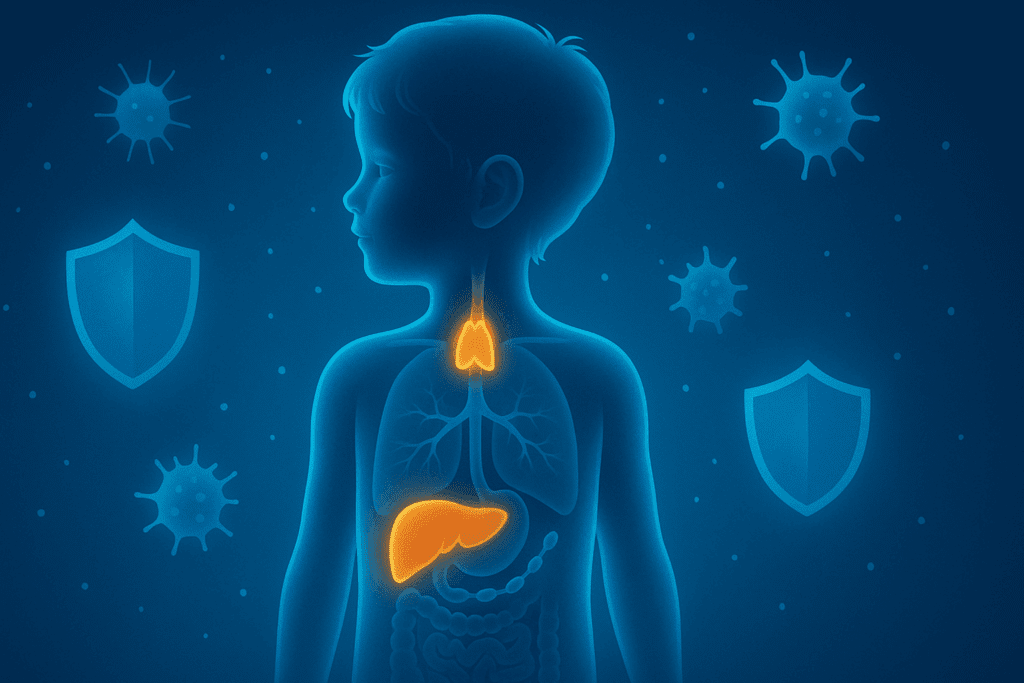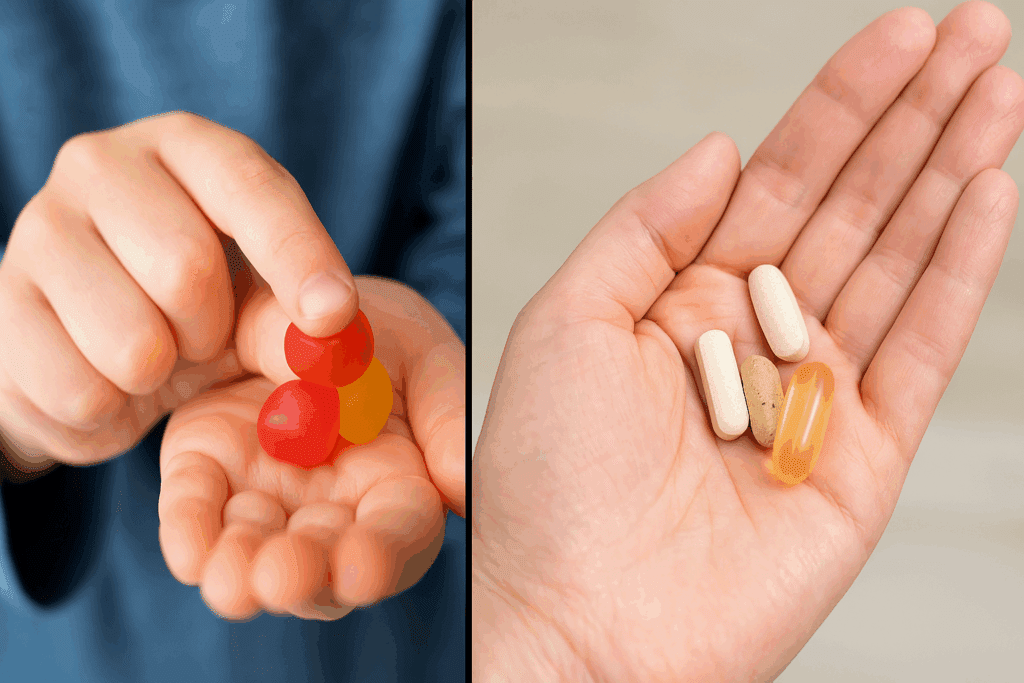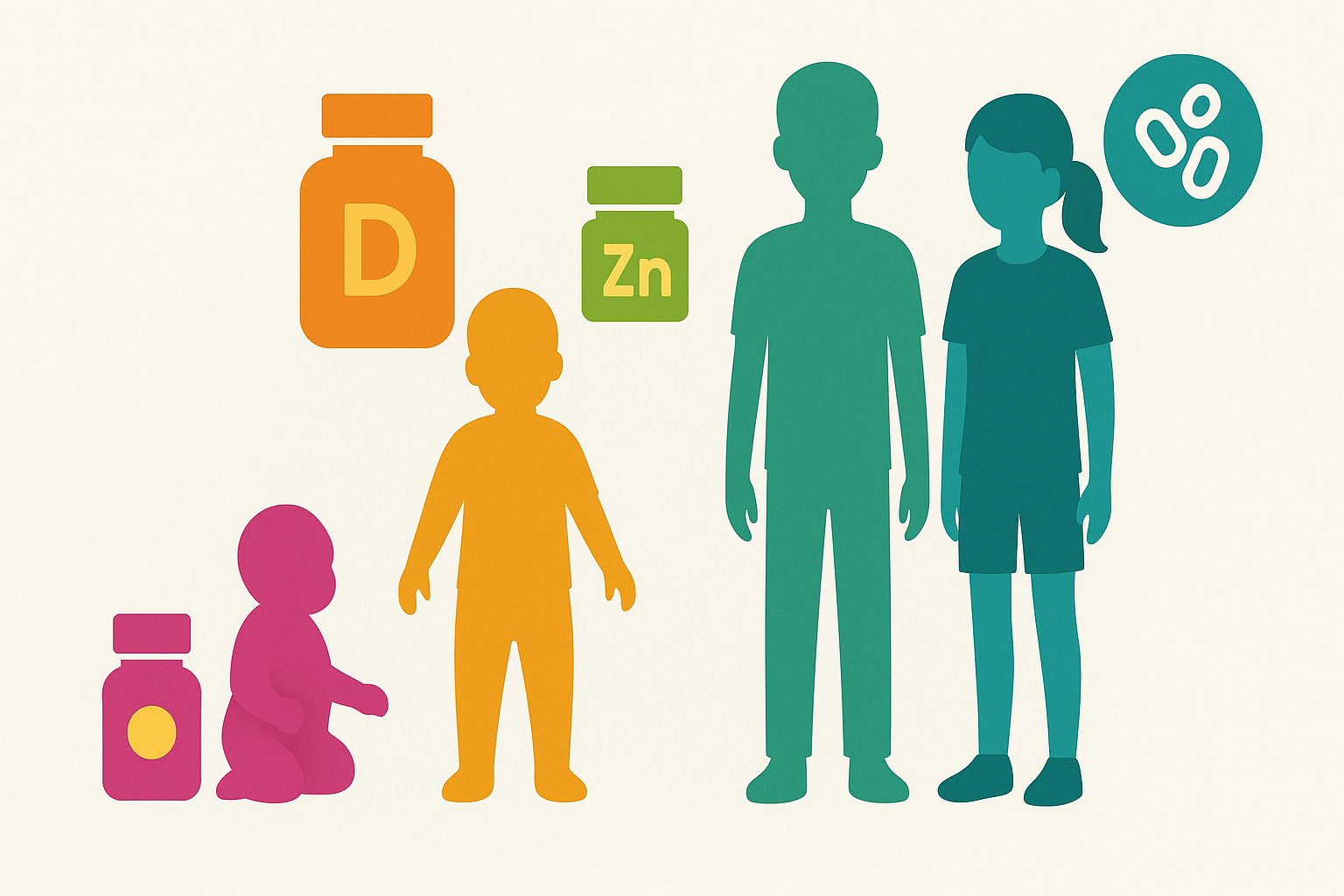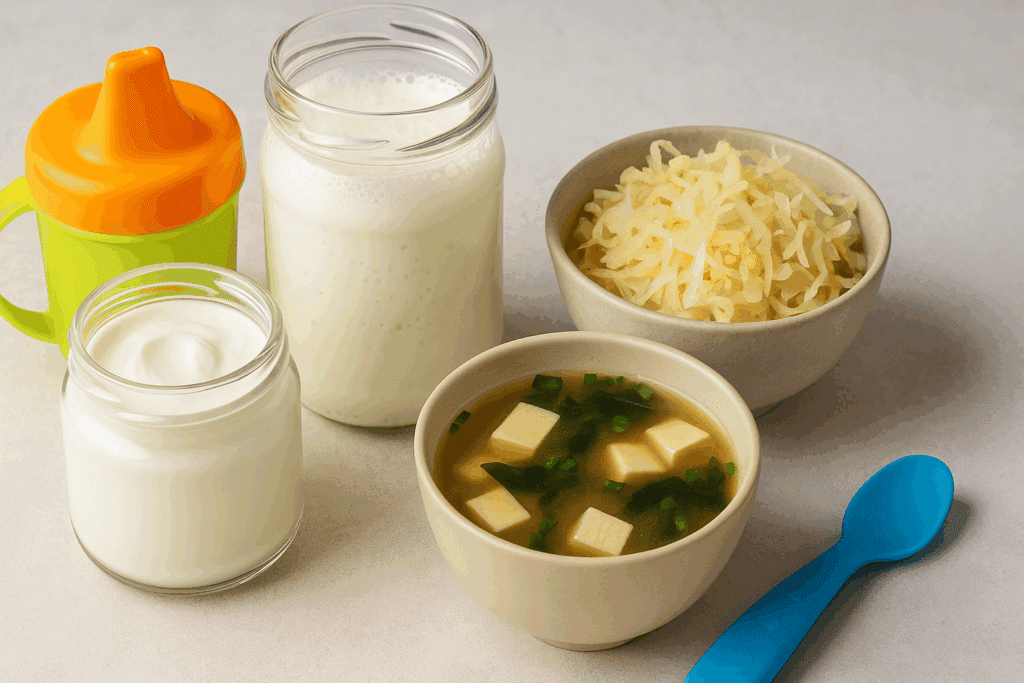In today’s health-conscious world, parents are increasingly vigilant about ensuring their children develop strong immune systems from an early age. Among the most widely discussed strategies for supporting children’s immune health is the use of kids immunity vitamins. These formulations, often tailored specifically to the physiological needs of growing bodies, are designed to provide essential nutrients that may be lacking in the average child’s diet. But with so many options on the market, how can a parent determine which products are safe, effective, and truly beneficial? This comprehensive guide explores the science, safety considerations, and practical applications behind kids immunity vitamins, equipping parents with evidence-based insights and professional guidance for making informed decisions.
You may also like: The Ultimate Guide to Choosing an Effective Immune Support Supplement for Daily Wellness

Understanding the Foundations of Immune Health in Children
To appreciate the value of vitamins for immune support, it’s essential to understand how a child’s immune system develops. From infancy through adolescence, the immune system undergoes rapid and complex changes. In the first few years of life, the immune response is immature and relies heavily on maternal antibodies, which gradually wane. By toddlerhood, children begin developing their own immune memory, encountering pathogens and building defenses through exposure, vaccination, and proper nutrition. Nutrients such as vitamins A, C, D, and E, as well as minerals like zinc and selenium, play critical roles in immune cell function, inflammation regulation, and pathogen elimination. When children lack these nutrients, whether due to picky eating, dietary restrictions, or lifestyle factors, their immune systems may be less resilient against infections.

What Makes Kids Immunity Vitamins Different from Adult Formulations?
It may be tempting to assume that children can simply take smaller doses of adult supplements, but this approach is not only flawed—it can be potentially dangerous. Kids immunity vitamins are uniquely formulated to align with a child’s specific developmental stage, metabolic rate, and nutritional needs. Unlike adult multivitamins, which may contain high concentrations of certain nutrients, kids formulas are carefully balanced to avoid toxicity while still promoting immune competence. Additionally, many kids supplements come in chewable, gummy, or liquid forms to make them more palatable for young users. Manufacturers also consider allergen avoidance, minimizing ingredients such as gluten, dairy, and artificial dyes that can trigger sensitivities. For infants and toddlers, who may not yet be able to chew or digest complex ingredients, pediatric formulations offer age-appropriate dosages and forms that are easier to absorb and metabolize.
Evaluating the Best Immune Booster for 2 Year Old Children
When searching for the best immune booster for 2 year old children, parents must approach the decision with both caution and curiosity. At this age, the immune system is still maturing, and toddlers often experience frequent colds and mild infections as their bodies learn to fight off invaders. An effective immune booster for this age group should provide core vitamins such as C and D, along with supportive minerals like zinc, in gentle doses that reflect current pediatric guidelines. Equally important are delivery methods; toddlers may resist pills or capsules, so products in the form of gummies, powders, or flavored liquids are often more successful. While supplements can help fill nutritional gaps, they should always be used to complement, not replace, a well-balanced diet rich in fruits, vegetables, whole grains, and lean proteins. Consulting a pediatrician before introducing any supplement is critical, especially if the child has a history of allergies or underlying health conditions.

Key Ingredients to Look for in the Best Immune Support for Kids
Not all immune-support products are created equal. To identify the best immune support for kids, it’s essential to understand which ingredients are supported by science and commonly recommended by pediatric health professionals. Vitamin C is renowned for its antioxidant properties and its role in supporting white blood cell function. Vitamin D, often deficient in children who have limited sun exposure, is vital for immune regulation and has been linked to reduced risk of respiratory infections. Zinc is another immune-boosting mineral, aiding in wound healing and defense against pathogens. Elderberry extract, though less essential from a nutritional standpoint, has gained popularity for its potential antiviral effects. Probiotics also play a role in immune health by maintaining a balanced gut microbiome, which is deeply connected to immune system functioning. When evaluating products, it’s important to assess not only the presence of these ingredients but also their dosages, purity, and source. Avoiding unnecessary additives or megadoses is key to maintaining safety and efficacy.
How Kids Immunity Vitamins Fit into a Holistic Health Routine
Kids immunity vitamins should never be seen as a standalone solution. Rather, they are one component of a broader health routine that includes proper nutrition, regular physical activity, sufficient sleep, stress management, and hygiene practices such as handwashing. A holistic approach acknowledges that the immune system is influenced by a complex interplay of internal and external factors. For instance, chronic sleep deprivation can impair immune response, while high levels of physical activity without adequate recovery can also strain the immune system. Social-emotional wellbeing also matters; children who experience chronic stress may be more susceptible to illness due to cortisol’s immunosuppressive effects. By integrating immune-supportive vitamins with these other health pillars, parents can create a sustainable wellness environment that promotes resilience and long-term vitality in their children.

The Role of Nutrition and Home Remedies to Increase Child Immunity
While supplements are valuable, many natural and traditional strategies also support a child’s immune function. Among the most reliable home remedies to increase child immunity are practices that center on wholesome nutrition. Diets rich in whole fruits, leafy greens, nuts, legumes, and omega-3 fatty acids from fish or flaxseed provide a powerful foundation for immune resilience. Bone broths, garlic, turmeric, and fermented foods such as yogurt or kefir have also been used across cultures for their immune-supportive properties. In addition to food-based approaches, lifestyle habits such as spending time outdoors, engaging in creative play, and minimizing screen time contribute to immune system balance by encouraging physical movement and reducing sedentary behaviors. Parents may also use herbal teas like chamomile or echinacea under pediatric guidance to support natural immunity. These home-based strategies can work synergistically with kids immunity vitamins to promote comprehensive health.
Why Safety Matters: Understanding Dosages and Interactions
Despite the enthusiasm around immune-boosting products, safety must remain a top priority. Children’s bodies process nutrients differently from adults, and exceeding the recommended daily allowance for certain vitamins—especially fat-soluble ones like A and D—can lead to toxicity. For instance, too much vitamin D over time can cause calcium buildup in the blood, resulting in nausea, weakness, or kidney complications. Furthermore, parents should be aware of potential interactions between supplements and prescription medications. A child taking antibiotics, for example, may need to avoid certain probiotic strains that could reduce the efficacy of the treatment. Understanding how different nutrients interact—such as zinc competing with copper absorption or iron interfering with calcium uptake—is important for choosing balanced formulations. Trustworthy manufacturers will often provide clear labeling, third-party testing, and child-specific dosage instructions. When in doubt, a consultation with a pediatric dietitian or physician can help ensure the chosen products are both effective and safe.

Comparing the Best Vitamins for Kids Immune System by Age Group
The nutritional needs of a toddler differ significantly from those of a school-aged child or a preteen. Consequently, the best vitamins for kids immune system should be tailored to developmental stages. For infants, infant immune support often comes through breastfeeding and specialized drops containing vitamin D. Toddlers typically benefit from multivitamins that offer iron, vitamin D, and B-complex nutrients, as they transition from breast milk or formula to solid foods. For older children, the immune challenges associated with school environments and increased social interaction may call for more robust support, including added antioxidants and probiotics. Teenagers, dealing with hormonal changes and increased stress, may require additional B vitamins and magnesium to support immunity and mood regulation. By selecting age-appropriate products, parents can ensure their children receive optimal immune support at every stage of growth.
Making Informed Choices: What to Look for on Supplement Labels
Decoding a supplement label can be a daunting task, especially for parents unfamiliar with nutritional terminology. However, learning to read these labels is essential for choosing safe and effective kids vitamins for immune system support. Key elements to consider include the form of each nutrient (e.g., methylated folate versus folic acid), the presence of third-party testing or certifications (such as NSF or USP), and the absence of unnecessary additives like high-fructose corn syrup, artificial sweeteners, or synthetic dyes. It’s also important to pay attention to serving sizes and daily values, ensuring that nutrients are provided in clinically relevant but safe amounts. Brands that are transparent about ingredient sourcing and manufacturing practices generally offer higher-quality products. Finally, understanding the differences between ‘natural’ and ‘synthetic’ ingredients, while nuanced, can help parents make informed decisions aligned with their health philosophy.
Integrating Toddler Immune Support into Daily Routines
For parents of young children, consistency and routine are essential to success. Incorporating toddler immune support into daily life requires more than just offering a gummy vitamin each morning. Establishing rituals that emphasize wellness—such as enjoying a nutritious breakfast together, taking a vitamin with a familiar drink, or singing a song while applying vitamin D drops—can make the experience enjoyable and habitual. Children are more likely to accept supplements when they are presented in a positive, stress-free manner. Involving kids in the selection process, especially older toddlers, can also increase compliance. Letting them choose between flavors or help open the bottle (under supervision) encourages ownership. Ultimately, embedding supplements into a nurturing daily routine reinforces the message that health is a priority and empowers children to take an active role in their own well-being.
Addressing Common Concerns About Immune System Booster for Kids
Despite the popularity of supplements, some parents remain hesitant about their use, and rightly so. Concerns about quality control, long-term safety, or the risk of dependency often arise when discussing immune system booster for kids. These are valid issues that merit thoughtful consideration. However, when used appropriately and under medical supervision, immune-boosting vitamins can complement a healthy lifestyle without replacing natural immune development. Critics sometimes argue that supplements are unnecessary if a child eats a balanced diet. While this is ideal, the reality is that many children do not consistently consume enough nutrient-rich foods due to busy schedules, picky eating, or socio-economic limitations. In such cases, supplements serve as an important bridge to nutritional adequacy. As with any intervention, moderation, transparency, and professional oversight are key.

Exploring the Role of Probiotics in Immune Support for Kids
Recent advances in microbiome science have revealed a fascinating connection between gut health and immunity. As a result, many parents are now turning to probiotics as a form of immune support for kids. Probiotics are live microorganisms, often found in yogurt, kefir, or supplements, that help maintain a healthy balance of gut flora. A well-balanced microbiome can enhance immune signaling, reduce inflammation, and prevent colonization by harmful pathogens. Specific strains such as Lactobacillus rhamnosus GG or Bifidobacterium lactis have been studied in children and shown to reduce the frequency and severity of respiratory and gastrointestinal infections. While not all kids immunity vitamins include probiotics, those that do offer a two-pronged approach: nutritional and microbial support. However, not all probiotics are equal, and parents should choose products with clinically validated strains, clear labeling, and age-appropriate formulations.
Navigating the Market: How to Identify the Best Vitamins for Toddlers Immune System
With a marketplace flooded with competing claims, choosing the best vitamins for toddlers immune system can feel overwhelming. To make sense of it all, parents should start by clarifying their child’s specific needs. Is the child vegetarian? Are there food allergies to consider? Is the child in daycare and exposed to many other children, increasing infection risk? These questions guide the selection process. Trusted sources such as pediatricians, clinical dietitians, and evidence-based health organizations can provide recommendations based on science rather than marketing. Parents should prioritize brands with strong reputations, transparent sourcing, and age-specific formulations. Supplements that combine essential vitamins with immune-modulating ingredients such as probiotics or plant extracts can offer enhanced support. Regularly revisiting supplement choices as children grow ensures that their needs continue to be met.
Infant Immune Support: Early Foundations for Lifelong Health
The first year of life is a critical period for immune development. During this time, infants rely heavily on passive immunity from breast milk or formula, which provides essential antibodies and nutrients. However, certain vitamins—particularly vitamin D—may need to be supplemented, especially for breastfed infants who receive limited sun exposure. Infant immune support often comes in the form of drops, ensuring precise dosing and easy administration. Parents must choose products that are free of alcohol, preservatives, and allergens. Pediatricians may also recommend iron supplements for infants at risk of deficiency, particularly those born prematurely or with low birth weight. Supporting the immune health of infants through proper nutrition, supplementation, and hygiene practices lays a strong foundation for lifelong wellness. Attention to these early interventions can reduce illness rates, support cognitive development, and promote a healthy trajectory into childhood and beyond.
Frequently Asked Questions (FAQ) About Immune Support and Kids Immunity Vitamins
What time of day is best for giving kids immunity vitamins to maximize absorption and effectiveness?
Giving kids immunity vitamins at the right time of day can enhance their absorption and optimize the body’s ability to use the nutrients. For most children, taking vitamins in the morning with breakfast is ideal because it aligns with the body’s natural circadian rhythm and avoids the risk of nighttime stimulation, especially with B vitamins. When paired with a meal that includes healthy fats, fat-soluble vitamins like A, D, E, and K are better absorbed. For immune support supplements that include probiotics, timing may depend on the strain; some perform best on an empty stomach, while others prefer food-based delivery. Consulting the supplement label and a pediatrician can ensure your child receives maximum benefit from their daily routine.
How can caregivers identify signs that their child may need additional immune support beyond diet alone?
While every child is different, certain behavioral and physical indicators may suggest the need for additional immune support for kids. Frequent colds, prolonged recovery times from minor illnesses, recurrent ear infections, and low energy despite sufficient sleep can all be red flags. Emotional stress, disrupted sleep patterns, or academic fatigue may also reflect underlying immune imbalances. Additionally, if your child has limited dietary diversity, is a picky eater, or avoids key food groups, they might be missing crucial nutrients found in the best vitamins for kids immune system. Monitoring these patterns and working with healthcare professionals can help create a targeted immune support plan tailored to your child’s unique needs.
Can environmental factors influence how effective kids immunity vitamins are?
Absolutely. Environmental conditions such as air quality, exposure to sunlight, seasonal shifts, and even geographic location can all affect how well kids immunity vitamins function within the body. For example, children in northern climates may require more vitamin D supplementation due to lower sun exposure, while urban pollution can increase oxidative stress, necessitating more antioxidant support. Indoor environments with poor ventilation may also increase pathogen exposure, prompting greater reliance on immune booster for kids. Likewise, during colder months, when viral infections are more prevalent, optimizing immune support for kids becomes especially important. Tailoring supplementation based on the environmental context ensures a proactive, responsive approach to children’s wellness.
What role does gut health play in choosing the best immune booster for 2 year old children?
Gut health is a cornerstone of immune system strength, especially in toddlers. Approximately 70% of immune cells reside in the gut, and the microbiome directly influences inflammation and immune response. When selecting the best immune booster for 2 year old children, look for products that include clinically backed probiotic strains such as Lactobacillus and Bifidobacterium, which help balance the gut flora. These probiotics can help improve nutrient absorption, reduce gastrointestinal infections, and regulate immune signaling. Pairing probiotics with prebiotic fibers in a child’s diet—like bananas or oats—can further enhance their efficacy and help establish a resilient microbiome during this formative stage.
How do psychological stressors affect the performance of immune system booster for kids?
Children are highly sensitive to emotional environments, and psychological stress can significantly impair immune function. Cortisol, the body’s stress hormone, can suppress the activity of immune cells, making children more vulnerable to infections. In families experiencing high levels of stress—due to school pressure, family transitions, or emotional trauma—the immune system booster for kids may require additional nutritional components, such as magnesium or adaptogenic herbs like ashwagandha, under professional supervision. Moreover, calming practices such as mindfulness activities, guided breathing, or play therapy can complement supplements and restore immune balance. Integrating emotional support alongside nutritional care creates a more holistic framework for immune resilience.
Are there differences between immune support for toddlers and support needed for older children?
Yes, the immune needs of toddlers differ from those of school-aged children and adolescents. Immune support for toddlers often focuses on foundational nutrients like vitamin D, iron, and zinc, along with probiotics to establish gut health. Toddlers are also more vulnerable to dietary inconsistencies due to picky eating and rapid developmental changes, making consistency in supplementation crucial. In contrast, older children may benefit from broader-spectrum antioxidants, B-complex vitamins for stress response, and botanical support as their immune systems mature and encounter new stressors. Understanding these developmental differences helps parents choose the best vitamins for toddlers immune system as a stepping stone toward long-term wellness.
What are some overlooked home remedies to increase child immunity naturally?
While diet and supplements are critical, many home remedies to increase child immunity are rooted in lifestyle habits and traditional wisdom. Regular exposure to natural light, for example, boosts vitamin D synthesis and supports mood regulation. Encouraging children to spend time barefoot on natural ground—a practice known as earthing—may reduce inflammation and oxidative stress, according to emerging research. Incorporating immune-supportive spices like ginger, turmeric, and cinnamon into meals can provide gentle yet powerful phytochemicals that enhance immunity. Warm saltwater gargles, eucalyptus-infused steam baths, and immune-boosting herbal teas (age-appropriate and pediatrician-approved) can also offer support. These approaches work best when combined with kids vitamins for immune system enhancement, creating a robust daily wellness ritual.
How can parents balance personalized nutrition and standard supplementation for immune support for kids?
Each child has unique biological and lifestyle factors that influence nutrient needs. While many products offer general immune support for kids, personalized approaches often yield better results. Factors such as metabolic rate, genetic polymorphisms, food sensitivities, and activity levels can all alter nutrient absorption and utilization. Parents can work with pediatric nutritionists to identify specific deficiencies using tools like hair mineral analysis or blood work. Based on these insights, supplements can be tailored for optimal effectiveness. For instance, a child with a zinc absorption issue might benefit from a more bioavailable form like zinc picolinate. This personalized approach ensures that even the best immune support for kids is fine-tuned to individual needs rather than relying on one-size-fits-all solutions.
What should parents know about emerging research in infant immune support?
Infant immune support is a rapidly evolving field, with new studies shedding light on the intricate connections between early nutrition, microbiome composition, and immune programming. Research is exploring how exposure to natural microbes during vaginal birth, breastfeeding, and skin-to-skin contact initiates immune literacy in newborns. Moreover, scientists are examining how human milk oligosaccharides (HMOs) in breast milk act as prebiotics that nurture beneficial gut bacteria and guide immune development. For formula-fed infants, innovations now include formula fortified with HMOs and probiotics to mimic these natural benefits. As more evidence accumulates, it’s likely that infant supplements will become more sophisticated, supporting not just basic vitamin needs but also long-term immune education.
How do you choose between different brands claiming to offer the best vitamins for kids immune system?
With countless brands competing for attention, it\u2019s important to go beyond marketing and evaluate products based on objective standards. The best vitamins for kids immune system will clearly list active ingredients, specify their forms (e.g., methylcobalamin vs. cyanocobalamin for B12), and offer age-specific dosages backed by scientific research. Look for products that are third-party tested for purity and potency, free from unnecessary fillers, and aligned with current pediatric guidelines. Reviews from parents can provide anecdotal insights, but certifications like NSF Certified for Sport or USP Verified carry more weight. Additionally, if you’re seeking toddler immune support or immune booster for kids with food allergies, prioritize allergen-free labels and brands with transparent sourcing and ethical manufacturing practices. This level of scrutiny ensures that parents make informed decisions grounded in safety and science.
Conclusion: Choosing the Right Kids Immunity Vitamins for Lifelong Wellness
The journey of selecting the right kids immunity vitamins is more than a routine health task—it is a reflection of a parent’s commitment to nurturing resilience, vitality, and confidence in their child’s future. As this guide has demonstrated, immune health is multifaceted, requiring an understanding of age-appropriate needs, safe dosages, and high-quality ingredients. Whether seeking the best immune booster for 2 year old toddlers, integrating probiotics for gut health, or exploring home remedies to increase child immunity, the most effective strategies are those grounded in evidence and guided by love. By blending expert knowledge with a holistic approach, parents can empower their children to thrive, not just avoid illness. When kids immunity vitamins are thoughtfully chosen and supported by good nutrition, sleep, activity, and emotional wellbeing, they become a valuable tool in the lifelong journey toward health. The key is not just in what supplements are given, but how they are integrated into a nurturing, informed, and wellness-centered lifestyle.
Further Reading:
6 Vitamins and Supplements That May Help Your Child’s Immune System
The 8 Best Vitamins for Kids, According to Dietitians
6 Vitamins and Supplements to Support Your Kids Immune System



